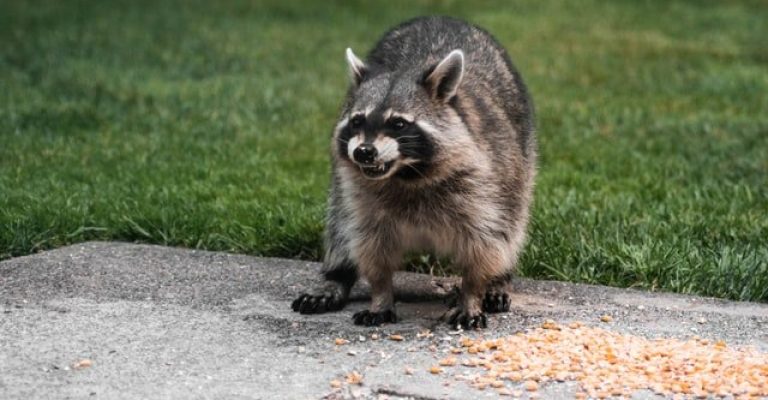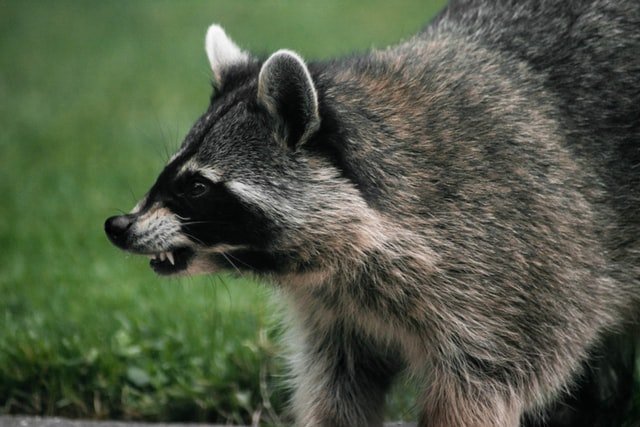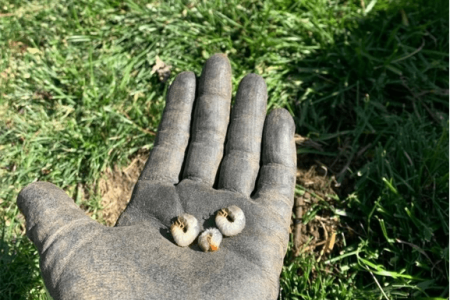Pest Control For Raccoons

Native to North America, raccoons are the largest of the procyonid family. Raccoons are one of the most incredibly adaptable animals on planet earth. Their original habitat is the deciduous and mixed forest, but because of their adaptability they have spread throughout mountainous, coastal, and urban areas.
Adaptability is a sign of intelligence, and raccoons have no shortage of intelligence.
Studies done in the 70’s and early 90’s have shown that a raccoon can remember the solution to tasks for up to three years!

Due to this high level of intelligence don’t be surprised when they find their way into your shut trash can lid or even seem to know the time when you take out the trash or how to get into your compost. These critters are cunning!
Let’s find out more about these crafty critters habits and what options you have to deal with them!
How to identify Raccoons
Raccoons are most notably characterized by their black “mask” of fur that surrounds their eyes contrasted with surrounding white fur around their face.
The rest of their bodies are covered in a thick brown and grey fur that keeps them warm during the winter months. They are the largest animals of their family being around 16 to 28 inches in length and weighing from 11 to 57 pounds.

While it is common to see raccoon mothers with a litter of cubs, raccoons often form separate groups based on sex due to the aggressive nature of males towards foreign kits (baby raccoons).
Female raccoons have their own territories and will often meet with other groups of females and their kits at common feeding grounds and watering holes. The males will form loose social groups to maintain their position within a territory against foreign males during mating season or other potential invaders.
Litter sizes range from 3 to six young. They young usually stick with their mothers for around 1 year before they begin to experiment with independence.
Raccoon Habits
Raccoons are omnivorous, meaning they eat both plants and meat.
Their ability to eat a wide variety of foods for sustenance and their fearless nature is what gives them the ability to be so adaptable to new environments.
This admirable quality leads them to urban areas where these amazing animals often become dangerous pests.

Naturally prone to scavenging raccoons will raid garbage cans, compost piles, bird feeders and gardens. Leaving pet food outside is a large factor that leads to drawing these critters attention to your home.
Known to be nocturnal animals, raccoons begin the bulk of their activity during the hours of twilight, when their eyesight is at its best. Being that they are out at night it can be difficult to catch them in the act, allowing them to invade an area undetected.
Raccoon Damage
These highly intelligent and adaptable creatures cause the most damage when creating a nesting site. Raccoon litters are often birthed during spring time like a majority of household pests. When females find a suitable location to den and nest they will remove roof shingles, wooden siding, and even roof top ventilation ducts to gain entry.
Once inside, insulation may be torn and damaged. They will also use the area to defecate and urinate causing rank odors and un-healthy living conditions. Raccoon feces carry roundworm which can cause serious disabilities. Small children are most prone to this ailment. Not only do they carry roundworm but they also commonly carry rabies, leptospirosis, giardiasis and more.
Clean up after getting rid of a raccoon infestation should be taken very seriously and only done with the proper training and PPE.
Raccoons once they have established a den or a territory can be extremely aggressive. They have a fearless nature and are not afraid to attack people or animals 3 to 4 times their size. If you have a raccoon den somewhere in your home, whether it be the attic, basement, crawlspace it should be known that a cornered raccoon is not to be approached and a professional should be contacted immediately.
Raccoons will often dig holes in lawns and turf In search of insects.
They are also known to pull up whole strips of freshly laid turf in when there are grubs living in the soil as they are a high protein food source for these critters.

Pest Control For Raccoons
There are several ways to protect your home or business from becoming the nesting site of a family of raccoons:
Prevent the entrance of raccoons to your basement, attics, and crawlspaces by reinforcing ventilation with steel flashing securely fastened by industrial means. Prevent raccoons from enter chimneys by firmly installing spark arresters to chimneys. These techniques are useful to excluding several types of pests as well.
Due to the danger element to trapping aggressive wild animals such as raccoons a professional should be consulted and utilized. Also professional trapping services are approved by the state of California to relocate these types of creatures. Attempting to release raccoons to a different area can carry a large fine and in some circumstances jail time.
3. Low-Voltage Electric Fence
Small low voltage electrical fencing can be a good alternative if you have a pond with fish that needs protection from these expert fishers. You can also have these types of barriers installed atop existing fences. They only need to be charged and electrified from dusk to sunrise.
If you find that you have a raccoon infestation or need advice and assistance installing exclusion measures call Got Gophers now for professional and affordable pest control services trusted by consumers and businesses for years!
How to Effortlessly Trap Summer Gophers in the Bay Area
Gophers Don’t Take a Summer Break Because the Bay Area’s weather stays mild, gophers remain busy underground even in summer. Moreover, dry soil pushes them
Smells That Attract Raccoons…And How To Avoid Them
If you have raccoons on your property call Got Gophers now! Raccoons are intelligent and resourceful creatures that can be drawn to certain smells in
Safeguard Your Sanctuary: Expert Strategies for Removing Raccoons with Precision
Understanding the Need for Removing Raccoons Raccoons can be dangerous! Do not risk disease or physical injury, call our trained professionals now! Removing raccoons from
Effective Methods for Trapping Moles
Trapping moles can get messy, contact Got Gophers and let us handle the rest. Moles can wreak havoc on your garden, leaving behind a trail
